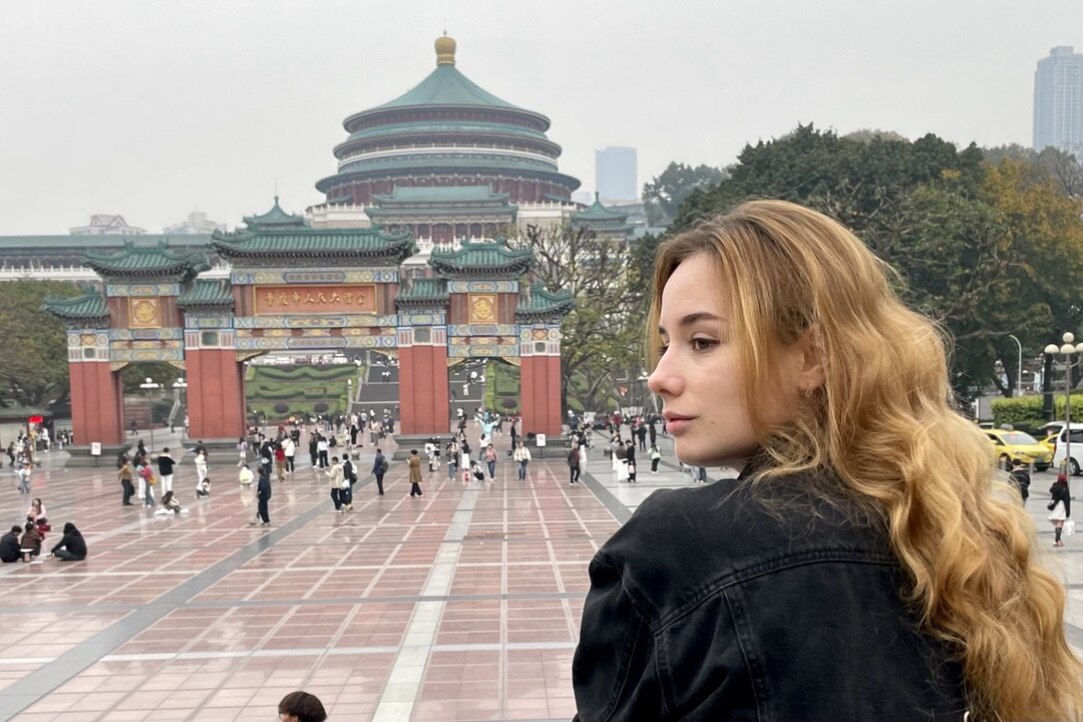'Each Day Was a Challenge': How HSE University-St Petersburg Student Conquers China's Ivy League
Anastasia Stadnik, 5th-year student of the bachelor's programme 'Asian and African Studies', spent an academic year at Nanjing University thanks to the academic mobility programme. In the interview, she shared how the studies in China's Ivy League were structured, when students had afternoon nap time, and how one could get a scholarship from the Chinese government.

University from the Ivy League
Starting from the first year at HSE University-St Petersburg, I have been dreaming of going to study in China to dive into the cultural and language environment. I received a scholarship from the Chinese government in the framework of a one-year mobility programme. To enrol, one has to confirm their language proficiency and submit some recommendation letters.
I got accepted to Nanjing University, which belongs to the C9 League, an alliance of nine elite universities in the country (an analogue of the American Ivy League). I was attracted not just by the status but also by the calm atmosphere of Nanjing.
Studying in Chinese turned out to be a challenge, especially at first. We were divided by our knowledge level for group classes—it was easier to adapt this way. I was in the same group with students from Korea, Malaysia, Japan, Thailand, the CIS countries, and even Egypt.
The classes started at eight in the morning. At noon, there was a two-hour break for lunch and a nap. My schedule included courses on national poetry, ancient literary language, business Chinese, and modern history. Additionally, we practised with my roommates in the dormitory. In the second semester, I lived with a girl from Korea, and we spoke mostly Chinese.
The students are assessed with a credit system similar to the one at HSE University. Each course has a certain number of credit hours and points. The final grade consisted of attendance, activity in the class, home assignments, intermediate tests, and a final exam. The most difficult exam to pass was business Chinese because of the specific vocabulary.
After the classes, we could go to a swimming pool, wushu or dance classes, or have training sessions in the stadium with a football field and a volleyball court. The campus was surrounded by the picturesque lake and blooming cherry trees, where we went for walks with my groupmates. Other leisure activities for us were board games and trips around China; luckily, the scholarship covered all the expenses. By the way, it is quite a typical leisure activity for the Chinese youth. An alternative would be a nightclub or karaoke. While senior citizens prefer dancing and singing in parks or squares, or playing chess.
The university also offered various activities, for instance, cooking moon cakes or drawing, which immersed us in the culture and aesthetics of the country even more. To let us get to know other international students better, they held the Cultures Day—an event where everyone presented the traditions of their countries.
Main Thing is Harmony
A peculiarity of the Chinese is that they try to maintain harmony. You can feel it in their attitude. Even strangers show their respect; they care about reputation. At the same time, they can be very straightforward and curious, but it is seen as a cute character trait. I also found some traditions very funny: to cure all illnesses with boiling water, go out in pyjamas, and grow long nails on pinkies.
There is harmony in architecture, leisure, and holidays. In the country, travellers meet a mixture of ancient and modern architecture. On the one hand, ancient pagodas are located next to ultramodern skyscrapers and futuristic art clusters. On the other hand, small villages coexist with endless rice fields, bamboo forests, and resorts with hot springs. Everyone must take a high-speed train, which takes you from one season to another in just an hour.
Over one year of mobility, one can catch all the important dates in China: the New Year (celebrated in February), the Mid-Autumn Festival, and the Dragon Boat Festival. For instance, during the New Year celebration, it looks like life in the country stops: most of the shops, cafes, and restaurants are closed, and there is almost no one in the streets. And the main highlight is a wonderful drone show.
There is also a very diverse gastronomic experience. It seemed like the food was everywhere: round-the-clock diners, markets with fresh products, and street food, which you cannot pass by. In the morning, in China, they usually serve soy milk, jianbing (fried flatbread), or hot pies—baozi. The prices are quite low, the lunch—for instance, a plate of flavorful noodles—would cost 165 roubles, a coffee—110.
Broader Perspective on Life
Studying at Nanjing University is a big professional leap: I stopped being afraid of mistakes and learnt to communicate confidently in various situations. HSE University-St Petersburg provided me with a valuable base of knowledge about the language and culture, and the employees of the study office answered all my questions and helped with the documents.
The trip taught me to leave my comfort zone. Education in China is a strict discipline and first-hand immersion in the language. Over this year, I became more adaptive: I quickly get used to cultural peculiarities and daily little things. But the most valuable thing that the mobility programme gave me is friends. I was surrounded by international people, not just Chinese students. The constant exchange of traditions and experiences made me more open, brave, and internally rich.
For me, it is important to master the language almost at the native level. Otherwise, it is impossible to feel as a part of the culture. In the future, I want to help Russian and Chinese companies not just work together but understand each other on a deeper level—through the language, culture, and joint projects. I plan to go back to China for an internship or studies to expand my experience and contribute to the development of cooperation between our countries.

